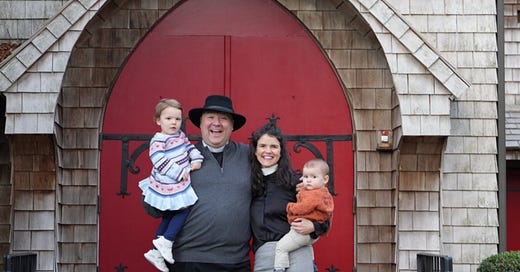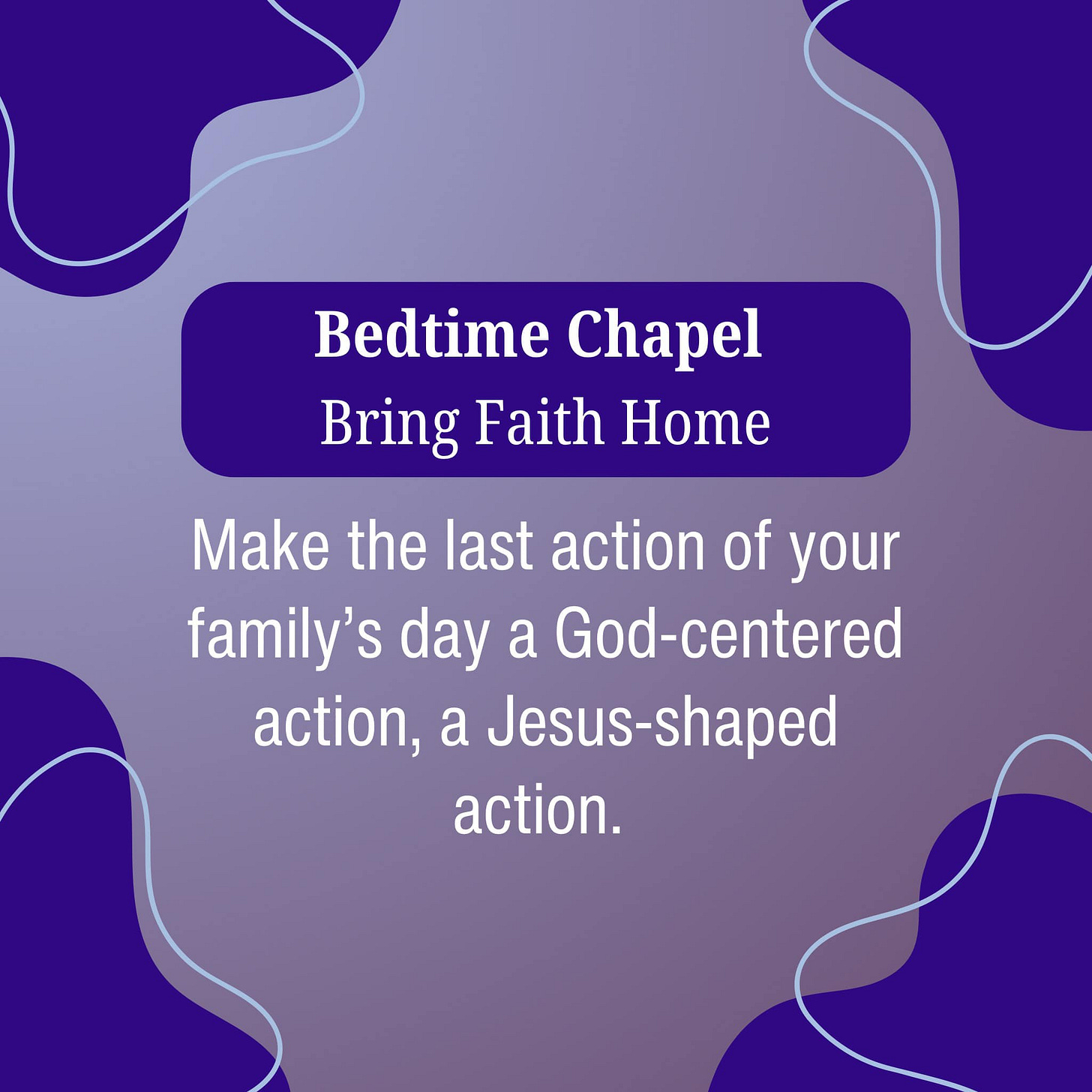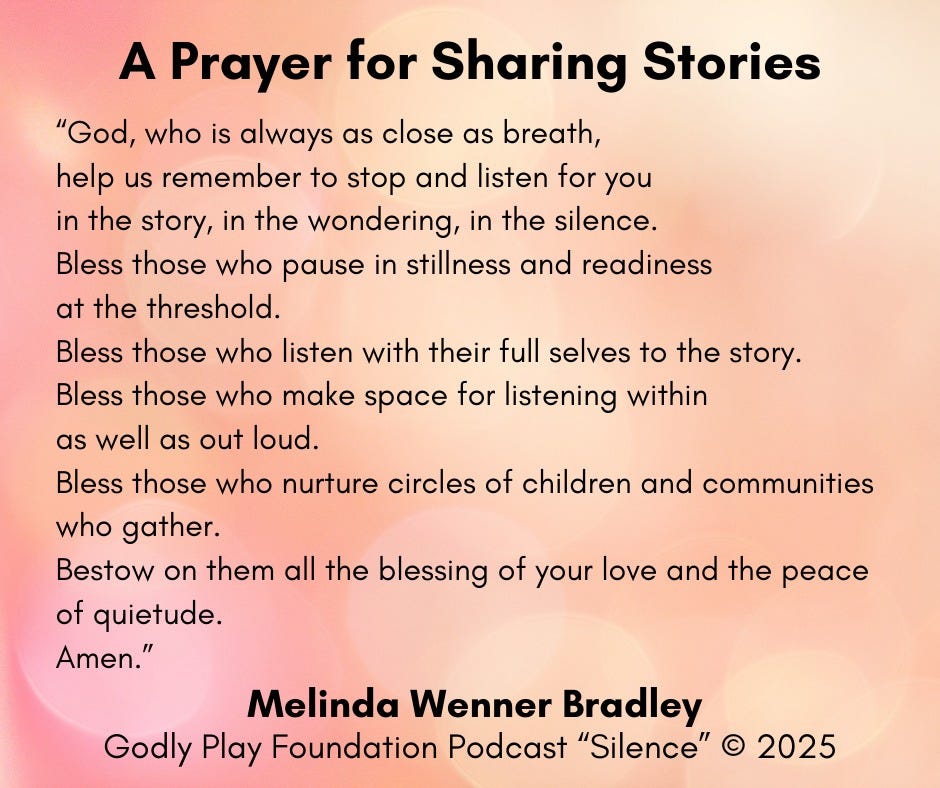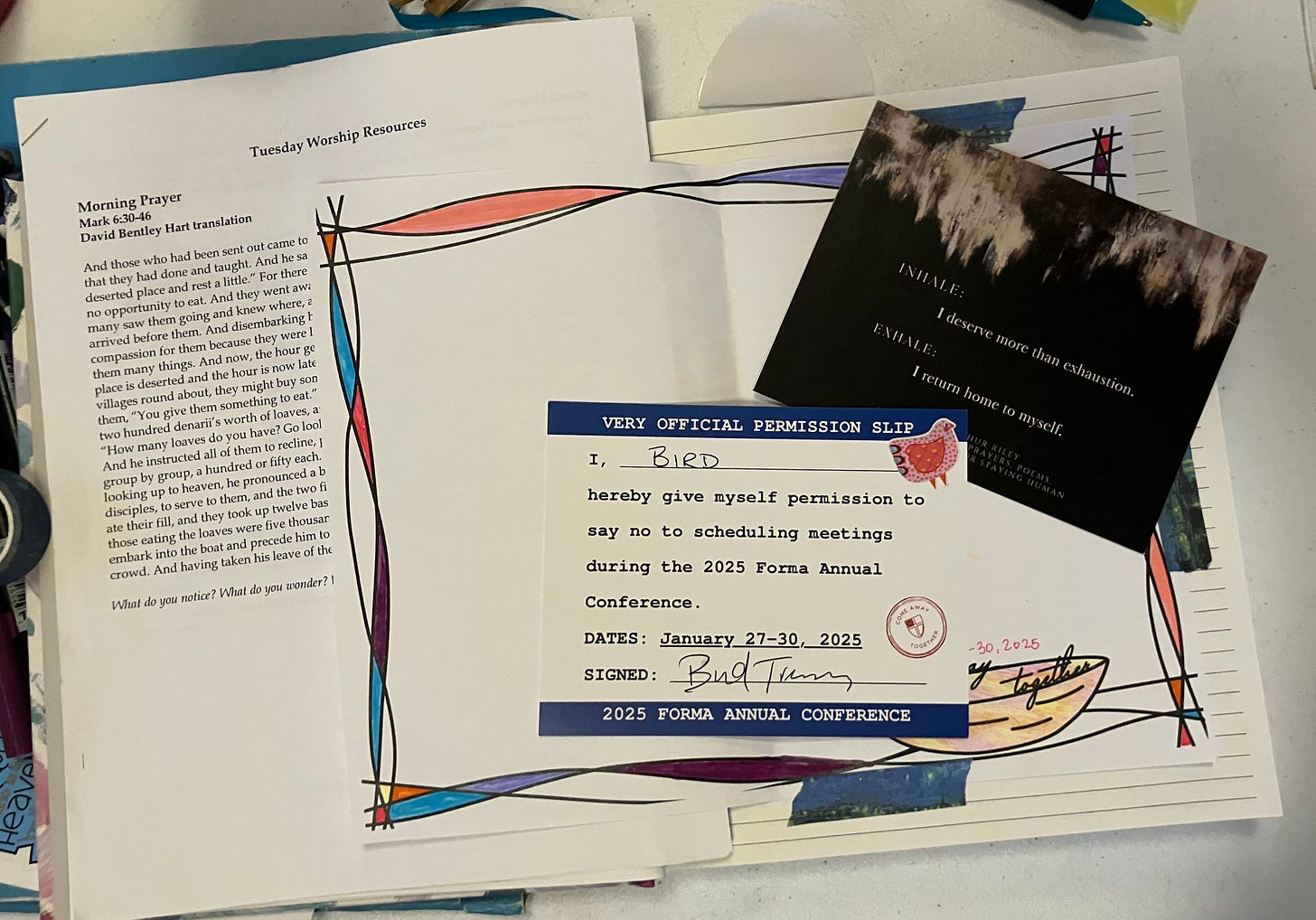A Very Special Episode
The first Wiggles & Wonder guest interview inside – featuring Bedtime Chapel
Hello Friends!
This week is the annual Forma Conference, the conference for formation professionals (lay, ordained, paid, and volunteer – everyone!) particularly of the Episcopal Church – though 10 denominations are represented this year. That would be a busy week under the best of circumstances (plus the theme is rest), but I’m one of Province 1’s cohosts at the Barbara C. Harris Camp & Conference Center, so things are bustling.
Being here at BCH is a great joy and I’m having so much fun with my friends and colleagues, and you’ll undoubtedly all hear my reflections on rest and sabbath in the coming weeks. This week, though, I’m bringing you something special: Wiggles & Wonder’s first interview!
This week’s interview is with the Revs. Natalie & James Thomas, a married deacon duo in the Diocese of Massachusetts and parents of two young children. This Advent, Natalie & James began releasing their beautiful new podcast Bedtime Chapel, which offers a brief, liturgically and scripturally rich way of praying as a family. Their nightly podcast is only about five minutes each night – great for even the youngest children – and really supports a deeper engagement with the seasons of the Church Year. They also have weekly Bible studies with seasonal guests and experts to help the grown-ups go deeper into the lectionary and reflect on ways of living into faith practices as a family at all stages of life.
I’m so excited to bring this interview to you and I hope you’ll sign up for the Bedtime Chapel newsletter, subscribe to their podcast, track them down on Instagram – all of those excellent things – and that in sharing their prayer practices, so deeply rooted in Anglican tradition, with us, we can all grow in faith.
[As per all interviews, this one has been edited and condensed for clarity, etc. etc. Let’s get into it.]
Bedtime Chapel: The Interview
Wiggles & Wonder: Congratulations on the podcast! I confess, I’m always a bit skeptical when people start a podcast (which I say as someone who has been on several) because it is, in theory, easy to do, but it’s difficult to do well. Bedtime Chapel’s production is definitely on the stronger side for an upstart. What motivated you to start a podcast and undertaking the work of recording your prayer and reflection offerings? How does this new project fit into how you understand your shared call as deacons?
Bedtime Chapel: Hi Bird, and thank you so much for inviting us for this interview. Well, one thing is sure, it’s definitely a lot of work to do a podcast well! We might have committed to more than we bargained for – but the good thing is that the work of Bedtime Chapel is “for” us as well as “for” anyone that’s praying with us.
As parents of two young kids (ages 3 and 1) we know how hard it is to find the energy and capacity for prayer at the end of the day – there are so many demands on parents and caregivers. We also know the value of a moment of prayer at the end of the day to connect with one another and with God as family. In our various ministries in the Episcopal church and, broadly speaking, mainline liturgical church, we saw this as a gap we could fill.
As deacons we are specifically called to be a “bridge” between the world and the church – with a particular focus on those who have been pushed to the margins. In our own way, we hope that this prayer offering can function as a bridge for people who want to bring faith home but aren’t sure where or how to start. And, as we know from the gospels, children can often be pushed to the margins. It’s our hope by learning to center children, we can build muscles to widen who feels welcome in our churches and for whom we develop liturgies.
Moreover, our shared call to the Renewed Diaconate is grounded in our critique of the failures of the institutional church, and, to put it plainly, TEC and other historic Protestant denominations have centered the personal preferences of donor classes over family formation. As vocational deacons, we’re called not only to name these failures of the institutional church but to spur corrective action among the faithful, and Bedtime Chapel is our offering.
WW: As you mentioned, you have two small children now and I imagine that they’re powerful motivators for finding rhythms of family prayer that are both traditional and developmentally appropriate – but what did your household prayer practices look like before you were parents?
BC: Actually, in the early part of our relationship we started praying together before bed to end our day. It was a nice way to end “together” when our days had been largely spent apart, but other than brief nighttime prayer, our personal devotions have looked pretty different. We have different prayer preferences!
Natalie is a bit more reformed/mystical in her prayer style, meaning worship music, centering prayer, chant and Bible Study. James is a Prayer Book Anglican who approaches Scripture through the daily office and scholarly works. The overlap is a love of silence in meeting God – thought we haven’t quite learned how to sit with Phoebe and Stephen in silence yet!
WW: Did your families pray with you regularly as children? What were you taught about prayer when you were young?
Natalie: I grew up in a Lutheran, Baptist, Methodist home – we prayed before meals and often did family devotions after dinner. A memory that really sticks with me is my maternal grandmother praying with us every time we took a road trip. I think, by her actions more than by words, I gleaned that it was important to pray and pray often.
James: As Bishop Alan Gates once said, I had two cradles. My mother is a second generation Irish immigrant raised and educated in parochial schools in the Archdiocese of Newark, NJ; our formal upbringing in the Roman Church was non-negotiable for her. And, my late grandfather on my father’s side was a local legend of an Episcopal priest who served the Diocese of Massachusetts for nearly sixty years. When I was a child, the Roman parish and the Episcopal parish were literally next door (this is no longer the case). We openly went back and forth and my grandfather was great friends with the pastor; they studied the common lectionary together over lunch on Wednesdays. It was a different time! Anyway, we were pretty well steeped in prayer as synonymous with public worship and the sacraments. We were churchy folk.
WW: One thing I appreciate about Bedtime Chapel is that, while it is largely structured by traditional compline, you’ve also added a spoken bit of the hymn Te lucis ante terminum, a traditional Latin hymn that, translated in meter both mirrors the patterns of nursery rhymes and remains tightly bound to tradition. How did you come to that choice?
BC: Bedtime Chapel is basically compline but with the Gospel reading from evensong. Condensing the full monastic liturgy of the hours into combined services is a venerable tradition in Anglicanism, and this seemed the natural way to thread the needle we were trying to thread. We speak in one episode about reclaiming “bedtime” as the mystical time to gather the family, so it was always going to be compline or “night prayer.” But, as deacons we also have a particular - peculiar, in a more archaic sense - vocation to the Gospel, and we are charged to share the Gospel. We do believe that to be Christian is to proclaim the identity of Jesus, and so we decided to simply read the Gospel every night.
As for the Te lucis, in the first draft we had Ecce Nunc there. But Ecce Nunc is one, not really the tone we were going for, and two, heavy on “Lord.” “Lord” isn’t the hill either of us would die on, but in general any LORD being used for Adonai in the Hebrew - for Christians, the First Person of the Trinity - we tend to change to “God.” Lord for the Second Person - “Kýrios Iēsoûs” - we tend to leave alone.
The St. Helena breviary steered us towards the Te lucis and it seemed an elegant solution. It’s the Common Worship translation, which, as you say, has a sing-song quality. While the translation in the Hymnal 1982 is actually a subtler and maybe more accurate rendering of the Latin, but it’s just not as good for compline for kids! We probably will change to Christe qui lux es et dies for Lent, but that will likely be the sole change to the hymnody.
WW: What resources have you found useful in talking about God with your children? Do you have favorite books or toys that support playing with faith? Are there things that seemed like they would be the obvious choices – prayer or story books, other podcasts, curriculum – that just didn’t work for you?
BC: At this age, the thing that’s worked the best is doing things together – definitely going to mass and celebrating the Eucharist. Phoebe (3) knows something special is happening around the altar and - while our conversation about Eucharist isn’t verbal yet, consuming the Bread and Wine right next to her, or communicating her if one of us is serving, is shaping her.
During Advent 2024 we lit candles every night and shared what we most needed that day – “hope, peace, love, or joy.” Our joint participation in the activity really made it something that stuck.
What hasn’t worked? It has been a whole lot harder to find a good children’s Bible than we would think. We’ve struggled to find one that represents the people in the stories, and the nature of God in the way we understand them.
WW: What do you hope other families discover in listening to Bedtime Chapel together?
BC: We are coming to understand that this is actually a ministry for families more than a ministry for children. We deliberately designed the prayer service in a way that would nourish an intergenerational audience.
By connecting with God on a more regular basis, we hope that caregivers and parents will come to feel more confident (that always feels like a strange word to use with faith), maybe more nearness to God in a way that supports them in being an at-home faith leader. We know that at-home modeling makes a HUGE difference in kids (and all humans) to make church something of their own.
All in all, we hope that families feel a bit more confident in the ways they are finding God in the home. That a lot can happen from a simple and short practice when done consistently. That kids learn more than we know by exposure and shared action. And, that we can learn about one another — our hopes and concerns — by praying together.
WW: Those are such powerful hopes and intentions. I also want to draw our readers’ attention to the other piece of Bedtime Chapel, which is what you intend to be really substantive scripture conversations designed for the caregivers who are using the Bedtime Chapel prayers with their families. What are you hoping your conversation partners can bring to the table?
BC: We want the scripture studies to deepen caregivers’ and parents’ comfort level with the scripture so they can pass it on to their families, and function as a remote conversation partner that helps listeners make sense of their own thoughts about the Bible. This includes providing some initial context for the readings of the upcoming week and then tying those passages into the work of forming younger disciples – either through practical application, personal commentary, or both.
We also want the conversation partner to interpret the passages through the lens of our current context - in a way that supports families to respond to God’s word through action. Bedtime Chapel is our attempt to build a community around the comforting thought that “you are not alone” if you’re struggling to transmit the Deposit of Faith in a post-Christian society.
WW: As someone who is constantly dreaming about faith formation resources (and I don’t even have kids yet), I think I find myself in a similar boat to you all in my determination to create something to fill those gaps, but we can’t do it all. Is there another resource you wish existed in the great big Christian parenting space?
BC: Well, as mentioned above, we are always looking for a good Children’s Bible. And, at the risk of saying something that already exists – we’d love to have retreats for parents and caregivers to support one another and build up our capacity for the forming that happens at home. We would love to take a weekend away (with or without kids as long as there was childcare!) and connect with other people who are trying to raise kids who act justly, love mercy, and walk humbly.
WW: Bedtime Chapel launched for the start of the new church year with Advent 2024. What are you most looking forward to as you make plans for Bedtime Chapel?
BC: Is it cheesy if we say spending time together? This ministry has been such a gift for the two of us because it’s given us a way to connect outside of being parents. There’s a powerful quote about marriage – that it’s often spent gazing in the same direction rather than gazing at one another. We love gazing at our kids, but Bedtime Chapel has allowed us to come alive in shared ministry.
And, almost equally so, we are excited to see how this community forms. It’s an honor to be praying with people all over the world. We are praying daily for the families that gather with us virtually and for God to use this podcast to build up the way of Jesus in the world.
WW: I just want to thank you both for spending this virtual time with me and the Wiggles & Wonder community. It’s a joy to see how you’ve found such a concrete and wide-reaching way of living into the work of the Vocational Diaconate as well as into your own faith and faithful parenting. What a blessing to us all!
The Round-Up
A few brief notes before I literally retreat into this conference space!
Interested in the Te Lucis and its rhythms? This post by Victoria Emily Jones over at the blog Art & Theology really gets at the comforting rhythms I heard in listening to it on Bedtime Chapel.
I’ve shouted out Godly Play’s podcasts before, but I’m especially loving this prayer (also pasted below) by my colleague and friend Melinda Wenner Bradley from her episode on Silence.
The Centre for Autism and Theology at the University of Aberdeen has a very cool talk coming up on February 20th, with several speakers coming together to talk about “Autism and Sensescaping,” with a real emphasis on resourcing worship communities. A bonus for me: their past-my-bedtime scheduling is actually in my prime time because they’re operating on GMT. You can find the Centre’s calendar here.
And now, back to the rest & retreat for real!
Peace,
Bird








Thank you so much for the opportunity to partner with you on this interview! We had a great time and are so excited to be part of the W&W community.